Analyzing Organizational Culture's Influence on Hilton Employees
VerifiedAdded on 2023/06/05
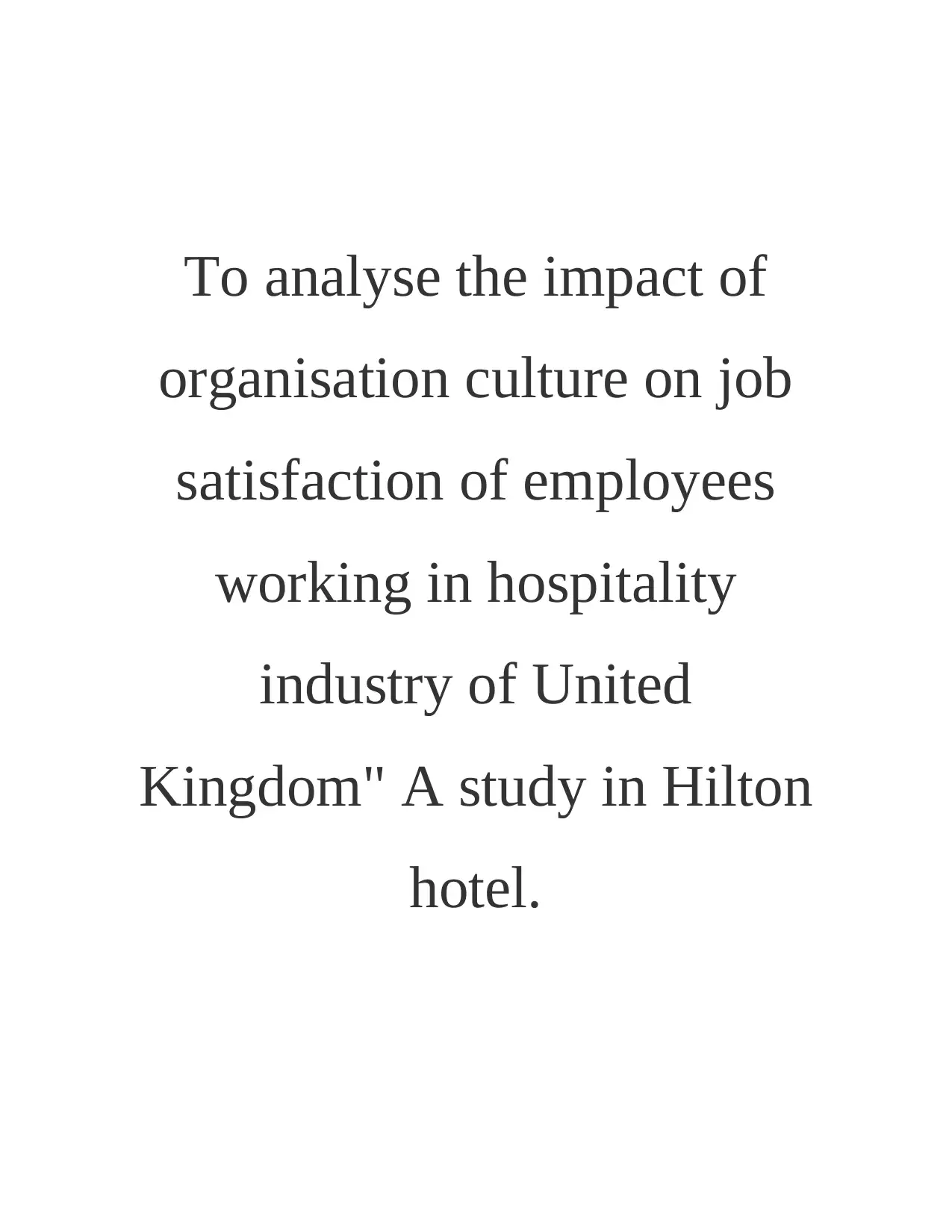
organisation culture on job
satisfaction of employees
working in hospitality
industry of United
Kingdom" A study in Hilton
hotel.
Paraphrase This Document
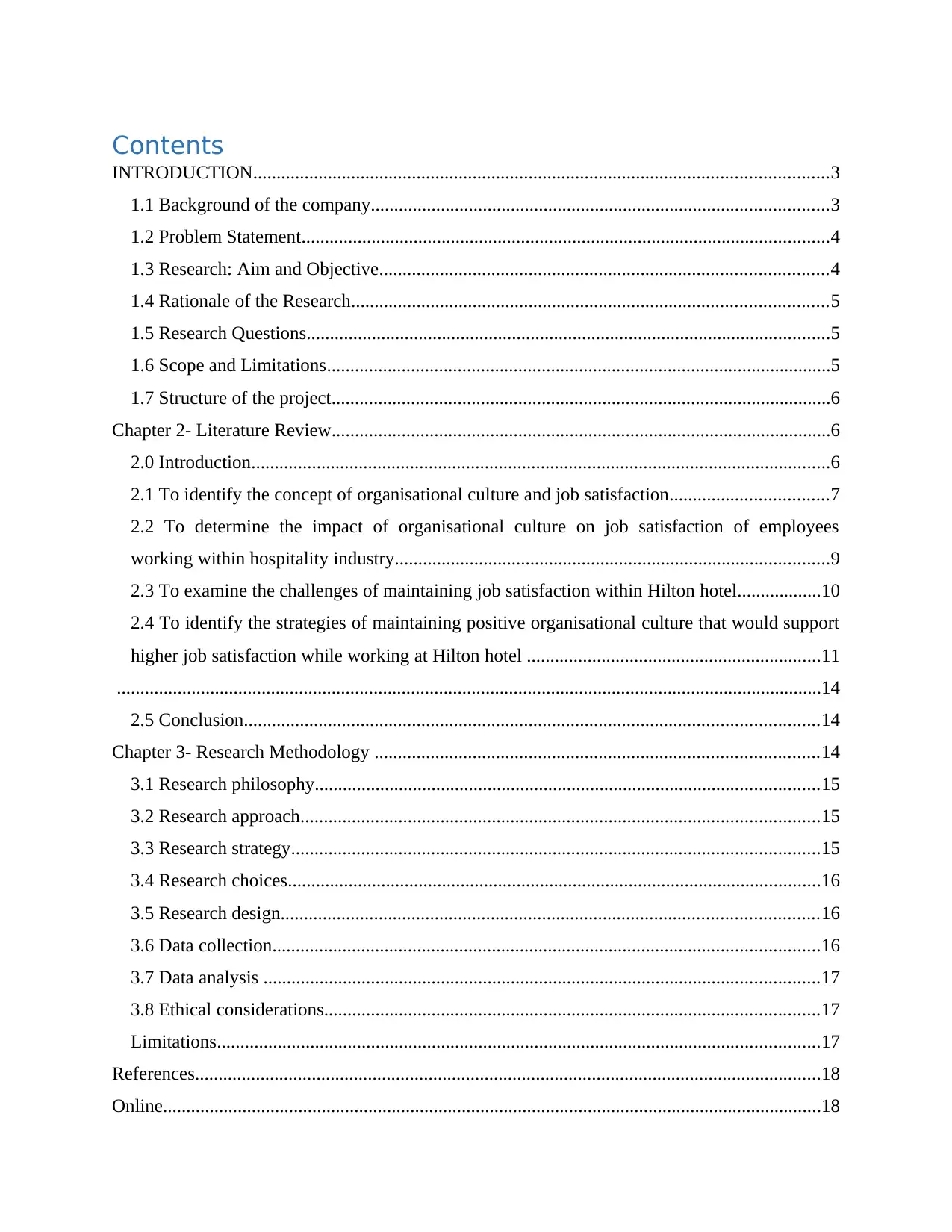
INTRODUCTION...........................................................................................................................3
1.1 Background of the company..................................................................................................3
1.2 Problem Statement.................................................................................................................4
1.3 Research: Aim and Objective................................................................................................4
1.4 Rationale of the Research......................................................................................................5
1.5 Research Questions................................................................................................................5
1.6 Scope and Limitations............................................................................................................5
1.7 Structure of the project...........................................................................................................6
Chapter 2- Literature Review...........................................................................................................6
2.0 Introduction............................................................................................................................6
2.1 To identify the concept of organisational culture and job satisfaction..................................7
2.2 To determine the impact of organisational culture on job satisfaction of employees
working within hospitality industry.............................................................................................9
2.3 To examine the challenges of maintaining job satisfaction within Hilton hotel..................10
2.4 To identify the strategies of maintaining positive organisational culture that would support
higher job satisfaction while working at Hilton hotel ...............................................................11
.......................................................................................................................................................14
2.5 Conclusion...........................................................................................................................14
Chapter 3- Research Methodology ...............................................................................................14
3.1 Research philosophy............................................................................................................15
3.2 Research approach...............................................................................................................15
3.3 Research strategy.................................................................................................................15
3.4 Research choices..................................................................................................................16
3.5 Research design...................................................................................................................16
3.6 Data collection.....................................................................................................................16
3.7 Data analysis .......................................................................................................................17
3.8 Ethical considerations..........................................................................................................17
Limitations.................................................................................................................................17
References......................................................................................................................................18
Online.............................................................................................................................................18
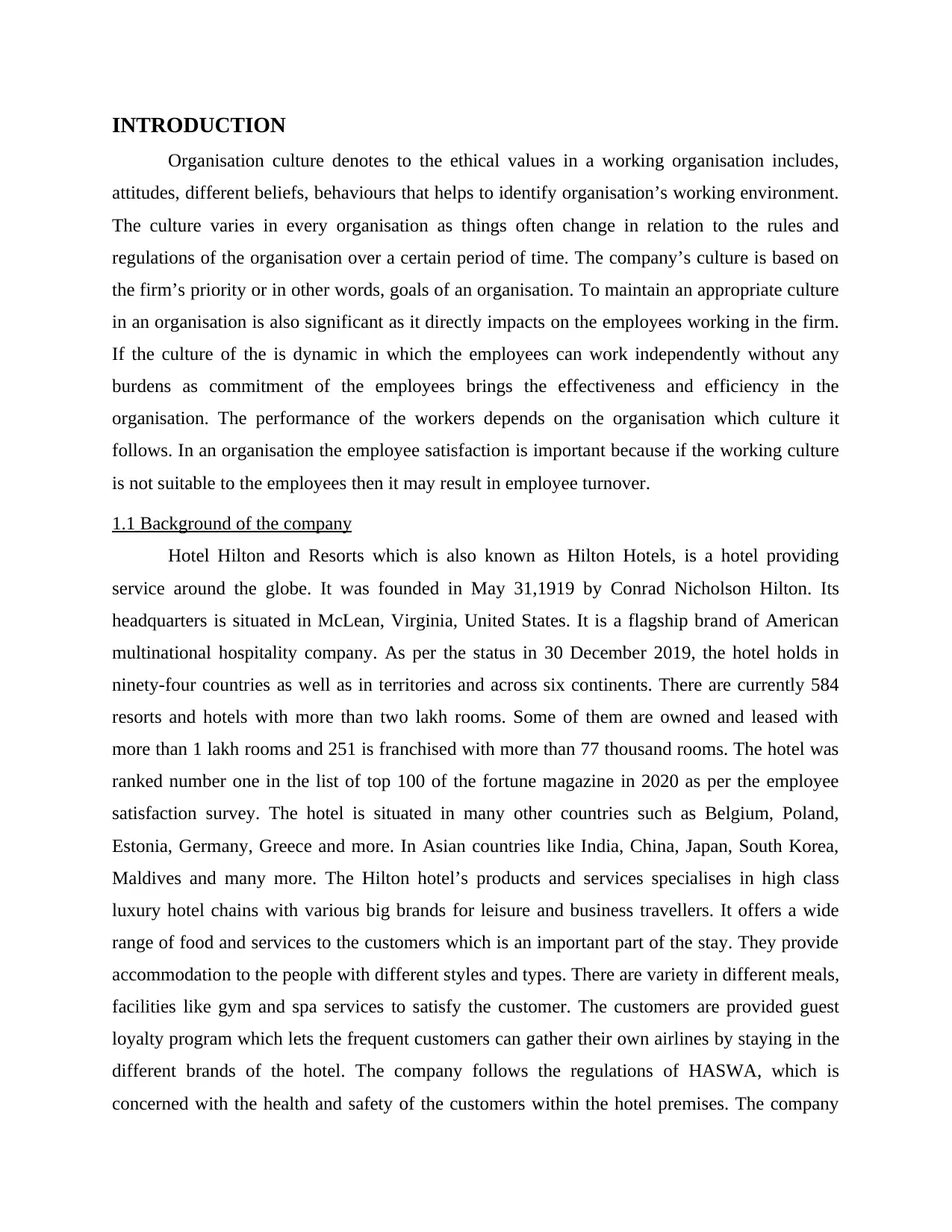
Organisation culture denotes to the ethical values in a working organisation includes,
attitudes, different beliefs, behaviours that helps to identify organisation’s working environment.
The culture varies in every organisation as things often change in relation to the rules and
regulations of the organisation over a certain period of time. The company’s culture is based on
the firm’s priority or in other words, goals of an organisation. To maintain an appropriate culture
in an organisation is also significant as it directly impacts on the employees working in the firm.
If the culture of the is dynamic in which the employees can work independently without any
burdens as commitment of the employees brings the effectiveness and efficiency in the
organisation. The performance of the workers depends on the organisation which culture it
follows. In an organisation the employee satisfaction is important because if the working culture
is not suitable to the employees then it may result in employee turnover.
1.1 Background of the company
Hotel Hilton and Resorts which is also known as Hilton Hotels, is a hotel providing
service around the globe. It was founded in May 31,1919 by Conrad Nicholson Hilton. Its
headquarters is situated in McLean, Virginia, United States. It is a flagship brand of American
multinational hospitality company. As per the status in 30 December 2019, the hotel holds in
ninety-four countries as well as in territories and across six continents. There are currently 584
resorts and hotels with more than two lakh rooms. Some of them are owned and leased with
more than 1 lakh rooms and 251 is franchised with more than 77 thousand rooms. The hotel was
ranked number one in the list of top 100 of the fortune magazine in 2020 as per the employee
satisfaction survey. The hotel is situated in many other countries such as Belgium, Poland,
Estonia, Germany, Greece and more. In Asian countries like India, China, Japan, South Korea,
Maldives and many more. The Hilton hotel’s products and services specialises in high class
luxury hotel chains with various big brands for leisure and business travellers. It offers a wide
range of food and services to the customers which is an important part of the stay. They provide
accommodation to the people with different styles and types. There are variety in different meals,
facilities like gym and spa services to satisfy the customer. The customers are provided guest
loyalty program which lets the frequent customers can gather their own airlines by staying in the
different brands of the hotel. The company follows the regulations of HASWA, which is
concerned with the health and safety of the customers within the hotel premises. The company
⊘ This is a preview!⊘
Do you want full access?
Subscribe today to unlock all pages.

Trusted by 1+ million students worldwide
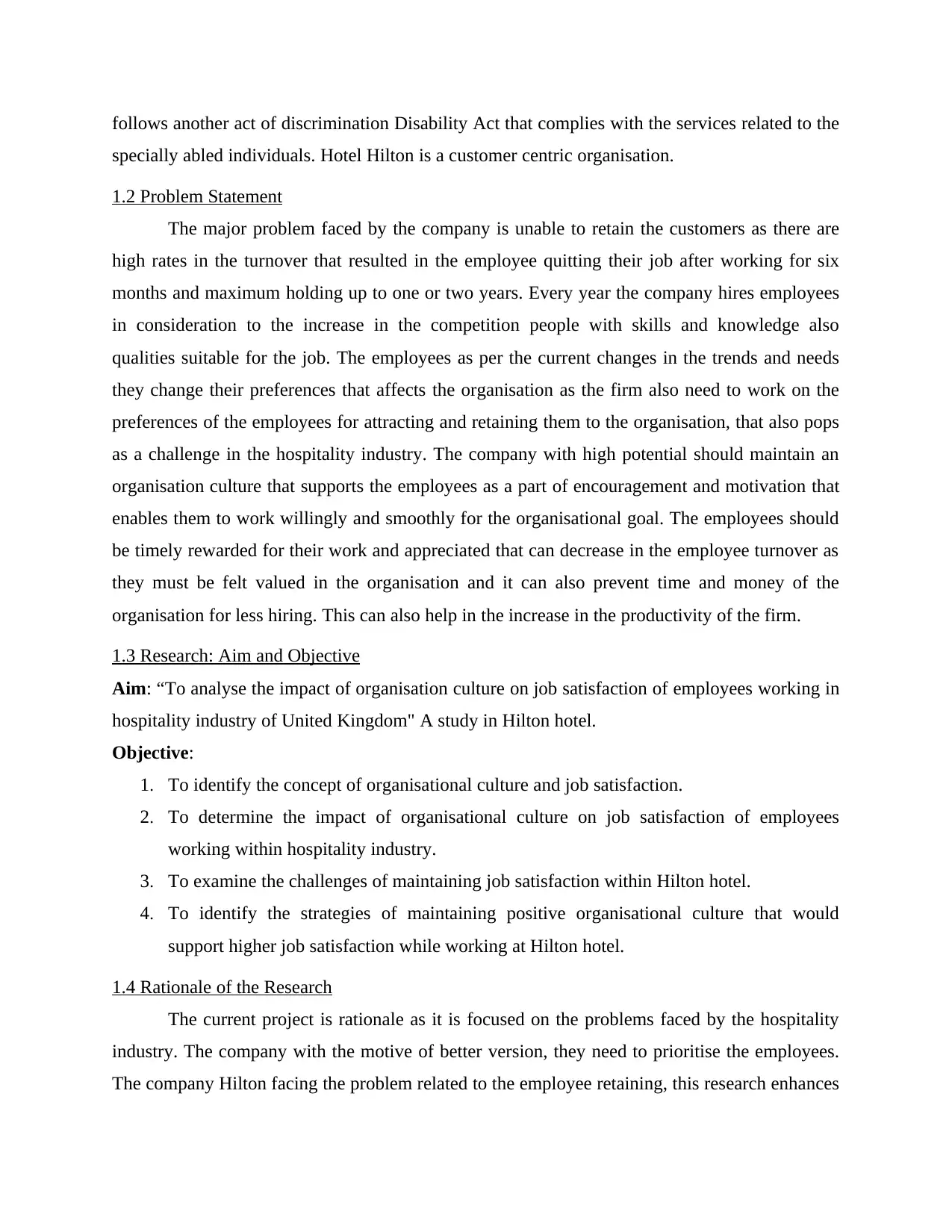
specially abled individuals. Hotel Hilton is a customer centric organisation.
1.2 Problem Statement
The major problem faced by the company is unable to retain the customers as there are
high rates in the turnover that resulted in the employee quitting their job after working for six
months and maximum holding up to one or two years. Every year the company hires employees
in consideration to the increase in the competition people with skills and knowledge also
qualities suitable for the job. The employees as per the current changes in the trends and needs
they change their preferences that affects the organisation as the firm also need to work on the
preferences of the employees for attracting and retaining them to the organisation, that also pops
as a challenge in the hospitality industry. The company with high potential should maintain an
organisation culture that supports the employees as a part of encouragement and motivation that
enables them to work willingly and smoothly for the organisational goal. The employees should
be timely rewarded for their work and appreciated that can decrease in the employee turnover as
they must be felt valued in the organisation and it can also prevent time and money of the
organisation for less hiring. This can also help in the increase in the productivity of the firm.
1.3 Research: Aim and Objective
Aim: “To analyse the impact of organisation culture on job satisfaction of employees working in
hospitality industry of United Kingdom" A study in Hilton hotel.
Objective:
1. To identify the concept of organisational culture and job satisfaction.
2. To determine the impact of organisational culture on job satisfaction of employees
working within hospitality industry.
3. To examine the challenges of maintaining job satisfaction within Hilton hotel.
4. To identify the strategies of maintaining positive organisational culture that would
support higher job satisfaction while working at Hilton hotel.
1.4 Rationale of the Research
The current project is rationale as it is focused on the problems faced by the hospitality
industry. The company with the motive of better version, they need to prioritise the employees.
The company Hilton facing the problem related to the employee retaining, this research enhances
Paraphrase This Document
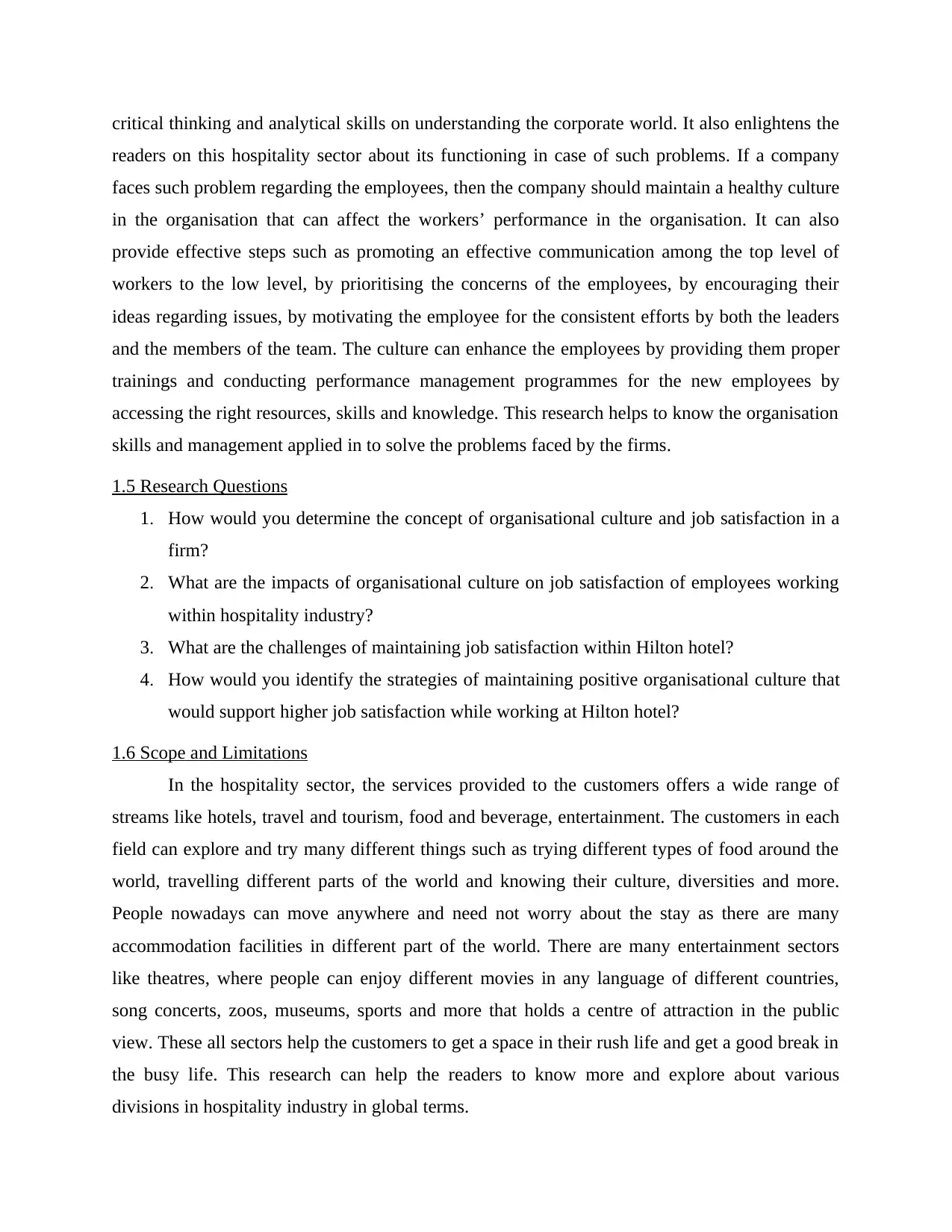
readers on this hospitality sector about its functioning in case of such problems. If a company
faces such problem regarding the employees, then the company should maintain a healthy culture
in the organisation that can affect the workers’ performance in the organisation. It can also
provide effective steps such as promoting an effective communication among the top level of
workers to the low level, by prioritising the concerns of the employees, by encouraging their
ideas regarding issues, by motivating the employee for the consistent efforts by both the leaders
and the members of the team. The culture can enhance the employees by providing them proper
trainings and conducting performance management programmes for the new employees by
accessing the right resources, skills and knowledge. This research helps to know the organisation
skills and management applied in to solve the problems faced by the firms.
1.5 Research Questions
1. How would you determine the concept of organisational culture and job satisfaction in a
firm?
2. What are the impacts of organisational culture on job satisfaction of employees working
within hospitality industry?
3. What are the challenges of maintaining job satisfaction within Hilton hotel?
4. How would you identify the strategies of maintaining positive organisational culture that
would support higher job satisfaction while working at Hilton hotel?
1.6 Scope and Limitations
In the hospitality sector, the services provided to the customers offers a wide range of
streams like hotels, travel and tourism, food and beverage, entertainment. The customers in each
field can explore and try many different things such as trying different types of food around the
world, travelling different parts of the world and knowing their culture, diversities and more.
People nowadays can move anywhere and need not worry about the stay as there are many
accommodation facilities in different part of the world. There are many entertainment sectors
like theatres, where people can enjoy different movies in any language of different countries,
song concerts, zoos, museums, sports and more that holds a centre of attraction in the public
view. These all sectors help the customers to get a space in their rush life and get a good break in
the busy life. This research can help the readers to know more and explore about various
divisions in hospitality industry in global terms.
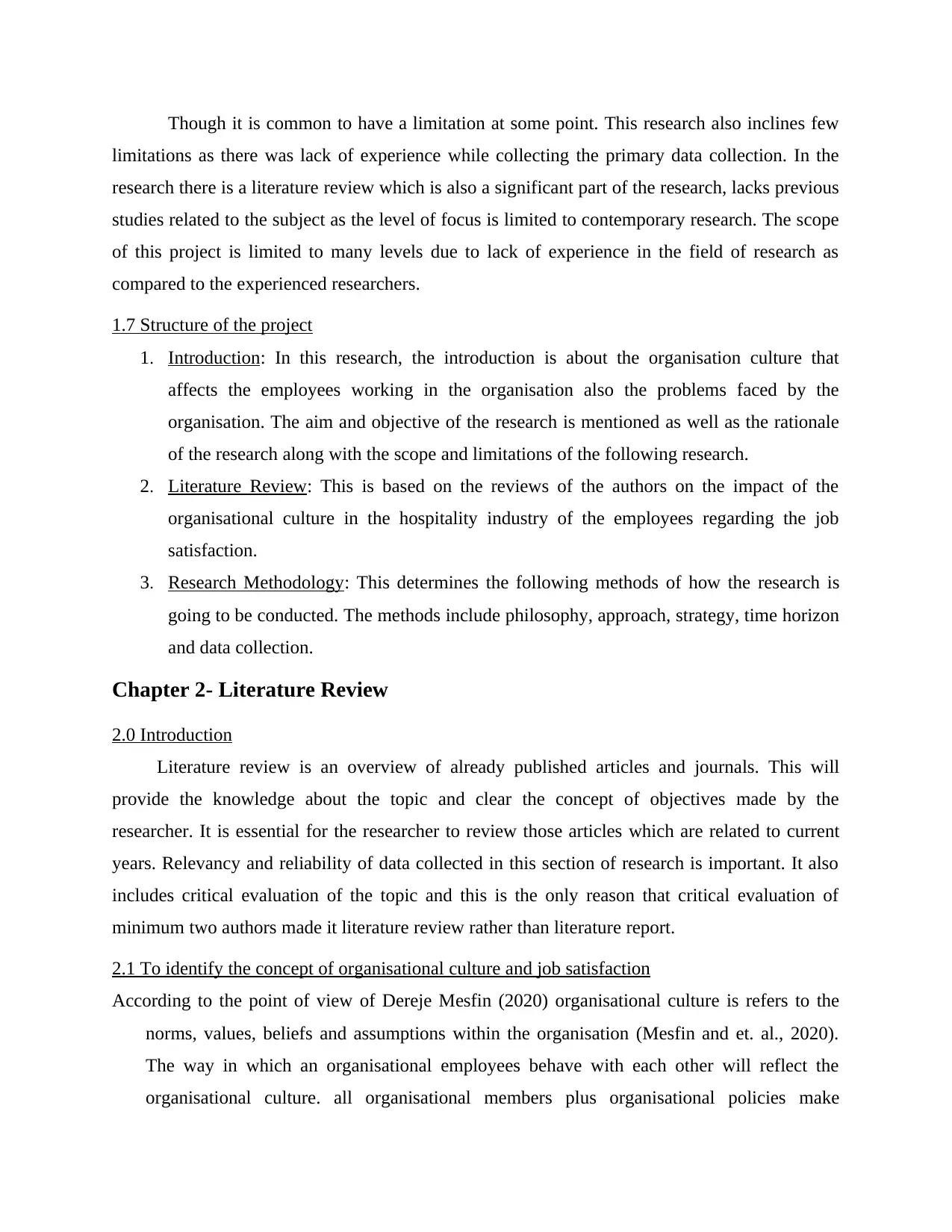
limitations as there was lack of experience while collecting the primary data collection. In the
research there is a literature review which is also a significant part of the research, lacks previous
studies related to the subject as the level of focus is limited to contemporary research. The scope
of this project is limited to many levels due to lack of experience in the field of research as
compared to the experienced researchers.
1.7 Structure of the project
1. Introduction: In this research, the introduction is about the organisation culture that
affects the employees working in the organisation also the problems faced by the
organisation. The aim and objective of the research is mentioned as well as the rationale
of the research along with the scope and limitations of the following research.
2. Literature Review: This is based on the reviews of the authors on the impact of the
organisational culture in the hospitality industry of the employees regarding the job
satisfaction.
3. Research Methodology: This determines the following methods of how the research is
going to be conducted. The methods include philosophy, approach, strategy, time horizon
and data collection.
Chapter 2- Literature Review
2.0 Introduction
Literature review is an overview of already published articles and journals. This will
provide the knowledge about the topic and clear the concept of objectives made by the
researcher. It is essential for the researcher to review those articles which are related to current
years. Relevancy and reliability of data collected in this section of research is important. It also
includes critical evaluation of the topic and this is the only reason that critical evaluation of
minimum two authors made it literature review rather than literature report.
2.1 To identify the concept of organisational culture and job satisfaction
According to the point of view of Dereje Mesfin (2020) organisational culture is refers to the
norms, values, beliefs and assumptions within the organisation (Mesfin and et. al., 2020).
The way in which an organisational employees behave with each other will reflect the
organisational culture. all organisational members plus organisational policies make
⊘ This is a preview!⊘
Do you want full access?
Subscribe today to unlock all pages.

Trusted by 1+ million students worldwide
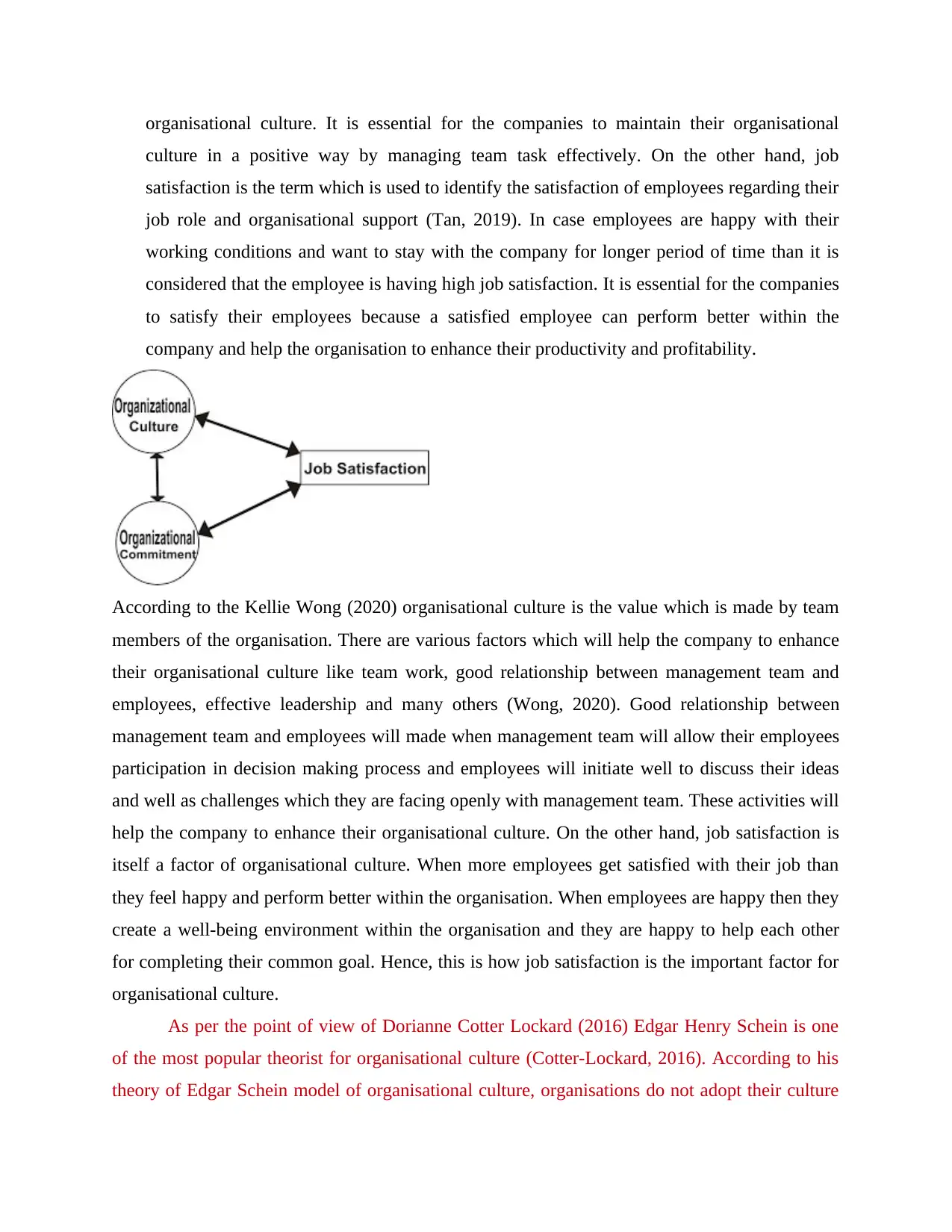
culture in a positive way by managing team task effectively. On the other hand, job
satisfaction is the term which is used to identify the satisfaction of employees regarding their
job role and organisational support (Tan, 2019). In case employees are happy with their
working conditions and want to stay with the company for longer period of time than it is
considered that the employee is having high job satisfaction. It is essential for the companies
to satisfy their employees because a satisfied employee can perform better within the
company and help the organisation to enhance their productivity and profitability.
According to the Kellie Wong (2020) organisational culture is the value which is made by team
members of the organisation. There are various factors which will help the company to enhance
their organisational culture like team work, good relationship between management team and
employees, effective leadership and many others (Wong, 2020). Good relationship between
management team and employees will made when management team will allow their employees
participation in decision making process and employees will initiate well to discuss their ideas
and well as challenges which they are facing openly with management team. These activities will
help the company to enhance their organisational culture. On the other hand, job satisfaction is
itself a factor of organisational culture. When more employees get satisfied with their job than
they feel happy and perform better within the organisation. When employees are happy then they
create a well-being environment within the organisation and they are happy to help each other
for completing their common goal. Hence, this is how job satisfaction is the important factor for
organisational culture.
As per the point of view of Dorianne Cotter Lockard (2016) Edgar Henry Schein is one
of the most popular theorist for organisational culture (Cotter-Lockard, 2016). According to his
theory of Edgar Schein model of organisational culture, organisations do not adopt their culture
Paraphrase This Document
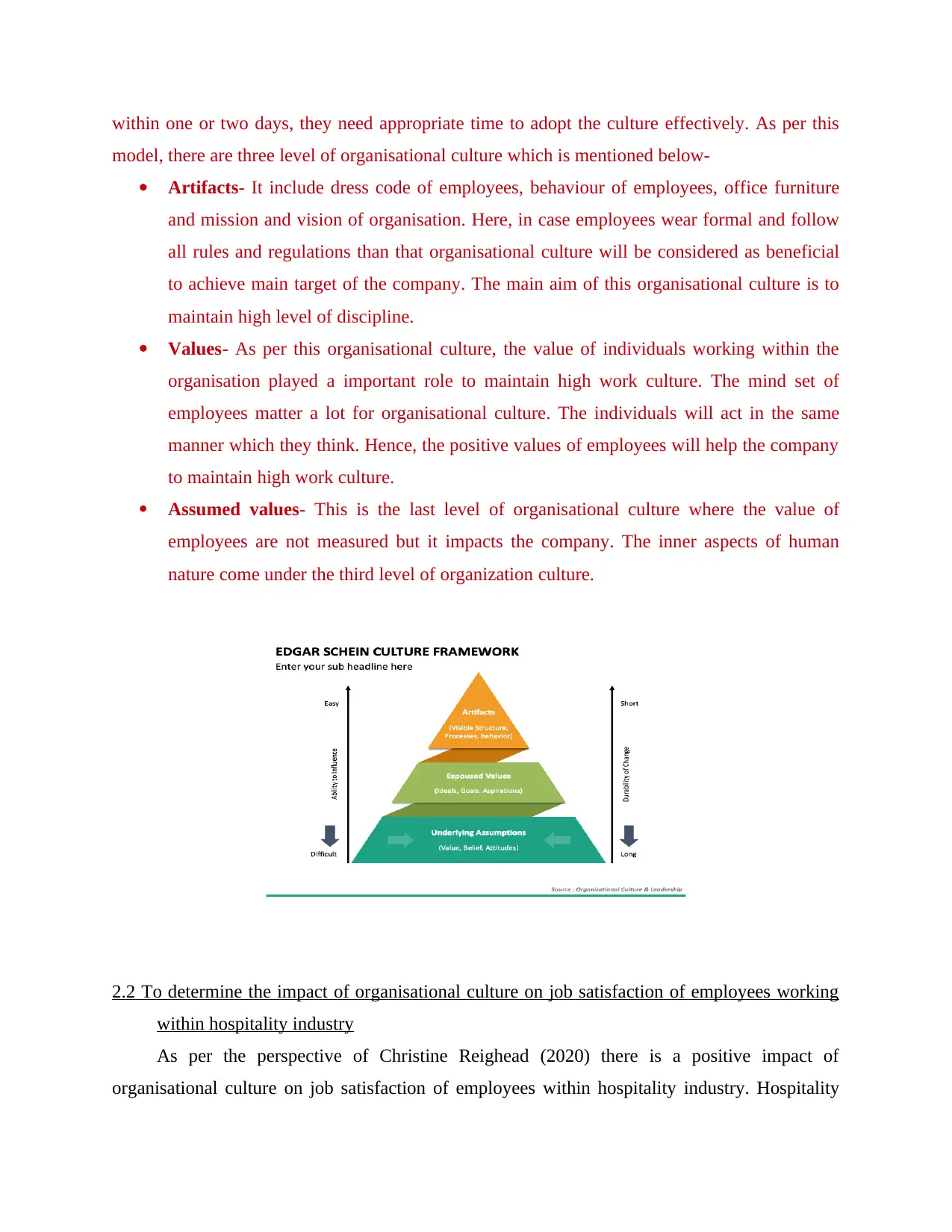
model, there are three level of organisational culture which is mentioned below-
Artifacts- It include dress code of employees, behaviour of employees, office furniture
and mission and vision of organisation. Here, in case employees wear formal and follow
all rules and regulations than that organisational culture will be considered as beneficial
to achieve main target of the company. The main aim of this organisational culture is to
maintain high level of discipline.
Values- As per this organisational culture, the value of individuals working within the
organisation played a important role to maintain high work culture. The mind set of
employees matter a lot for organisational culture. The individuals will act in the same
manner which they think. Hence, the positive values of employees will help the company
to maintain high work culture.
Assumed values- This is the last level of organisational culture where the value of
employees are not measured but it impacts the company. The inner aspects of human
nature come under the third level of organization culture.
2.2 To determine the impact of organisational culture on job satisfaction of employees working
within hospitality industry
As per the perspective of Christine Reighead (2020) there is a positive impact of
organisational culture on job satisfaction of employees within hospitality industry. Hospitality
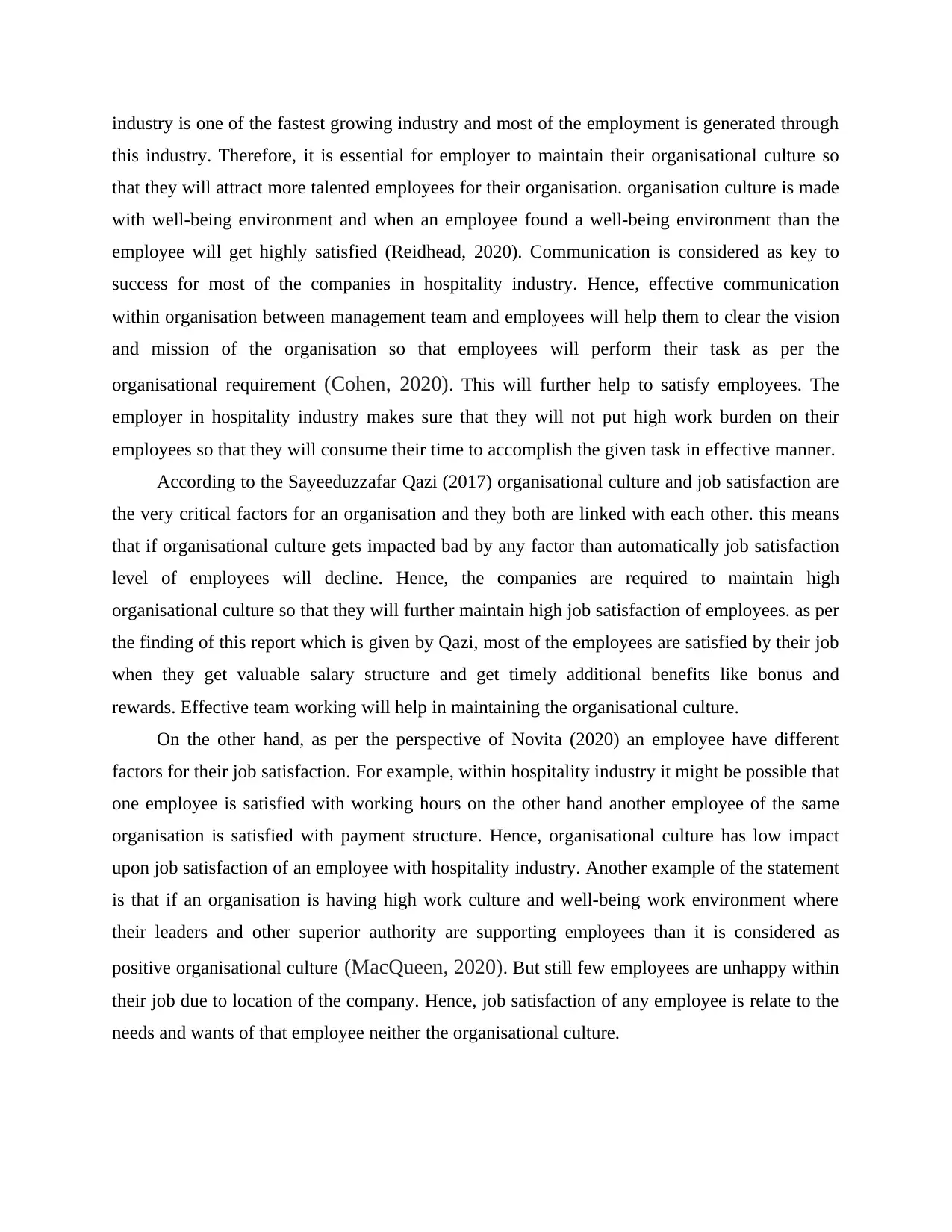
this industry. Therefore, it is essential for employer to maintain their organisational culture so
that they will attract more talented employees for their organisation. organisation culture is made
with well-being environment and when an employee found a well-being environment than the
employee will get highly satisfied (Reidhead, 2020). Communication is considered as key to
success for most of the companies in hospitality industry. Hence, effective communication
within organisation between management team and employees will help them to clear the vision
and mission of the organisation so that employees will perform their task as per the
organisational requirement (Cohen, 2020). This will further help to satisfy employees. The
employer in hospitality industry makes sure that they will not put high work burden on their
employees so that they will consume their time to accomplish the given task in effective manner.
According to the Sayeeduzzafar Qazi (2017) organisational culture and job satisfaction are
the very critical factors for an organisation and they both are linked with each other. this means
that if organisational culture gets impacted bad by any factor than automatically job satisfaction
level of employees will decline. Hence, the companies are required to maintain high
organisational culture so that they will further maintain high job satisfaction of employees. as per
the finding of this report which is given by Qazi, most of the employees are satisfied by their job
when they get valuable salary structure and get timely additional benefits like bonus and
rewards. Effective team working will help in maintaining the organisational culture.
On the other hand, as per the perspective of Novita (2020) an employee have different
factors for their job satisfaction. For example, within hospitality industry it might be possible that
one employee is satisfied with working hours on the other hand another employee of the same
organisation is satisfied with payment structure. Hence, organisational culture has low impact
upon job satisfaction of an employee with hospitality industry. Another example of the statement
is that if an organisation is having high work culture and well-being work environment where
their leaders and other superior authority are supporting employees than it is considered as
positive organisational culture (MacQueen, 2020). But still few employees are unhappy within
their job due to location of the company. Hence, job satisfaction of any employee is relate to the
needs and wants of that employee neither the organisational culture.
⊘ This is a preview!⊘
Do you want full access?
Subscribe today to unlock all pages.

Trusted by 1+ million students worldwide
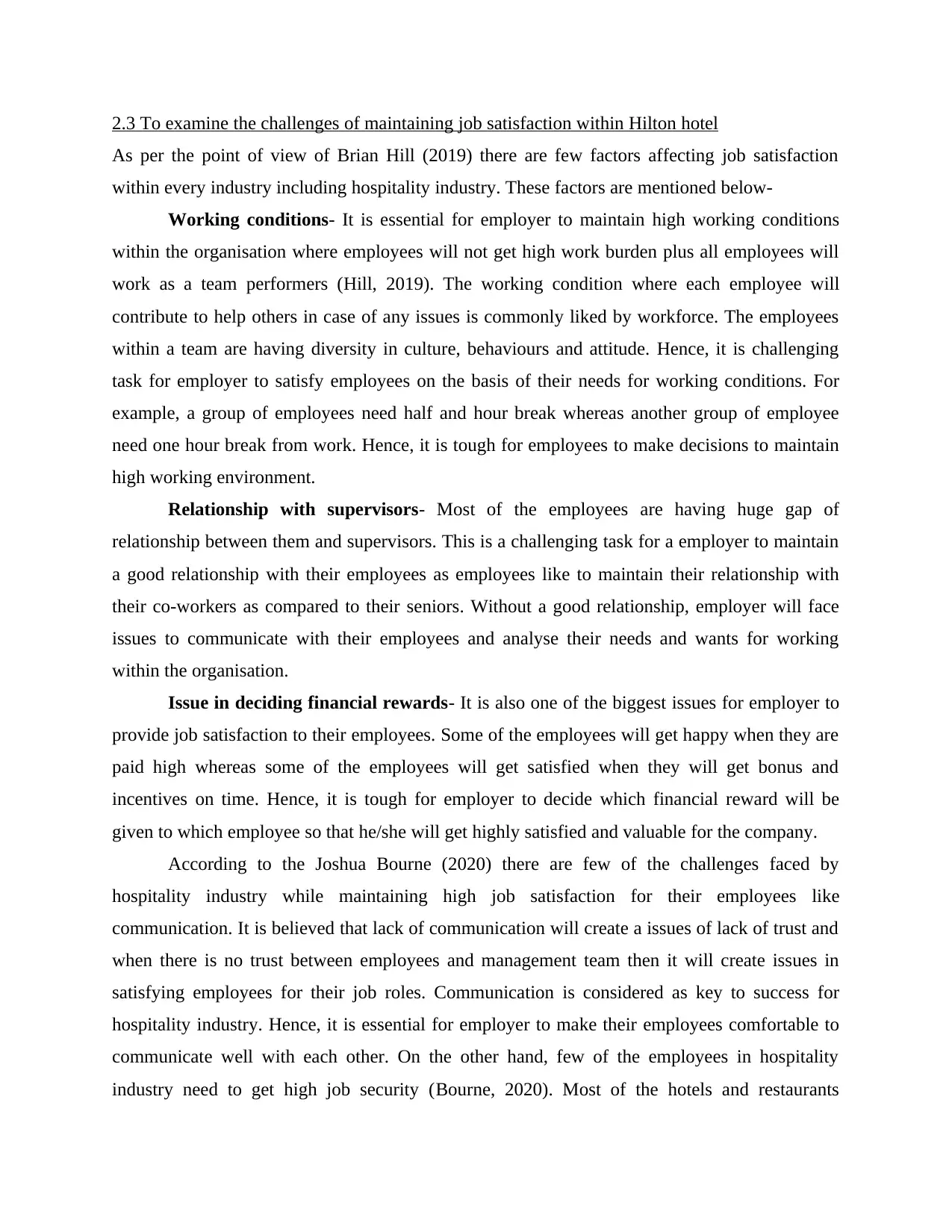
As per the point of view of Brian Hill (2019) there are few factors affecting job satisfaction
within every industry including hospitality industry. These factors are mentioned below-
Working conditions- It is essential for employer to maintain high working conditions
within the organisation where employees will not get high work burden plus all employees will
work as a team performers (Hill, 2019). The working condition where each employee will
contribute to help others in case of any issues is commonly liked by workforce. The employees
within a team are having diversity in culture, behaviours and attitude. Hence, it is challenging
task for employer to satisfy employees on the basis of their needs for working conditions. For
example, a group of employees need half and hour break whereas another group of employee
need one hour break from work. Hence, it is tough for employees to make decisions to maintain
high working environment.
Relationship with supervisors- Most of the employees are having huge gap of
relationship between them and supervisors. This is a challenging task for a employer to maintain
a good relationship with their employees as employees like to maintain their relationship with
their co-workers as compared to their seniors. Without a good relationship, employer will face
issues to communicate with their employees and analyse their needs and wants for working
within the organisation.
Issue in deciding financial rewards- It is also one of the biggest issues for employer to
provide job satisfaction to their employees. Some of the employees will get happy when they are
paid high whereas some of the employees will get satisfied when they will get bonus and
incentives on time. Hence, it is tough for employer to decide which financial reward will be
given to which employee so that he/she will get highly satisfied and valuable for the company.
According to the Joshua Bourne (2020) there are few of the challenges faced by
hospitality industry while maintaining high job satisfaction for their employees like
communication. It is believed that lack of communication will create a issues of lack of trust and
when there is no trust between employees and management team then it will create issues in
satisfying employees for their job roles. Communication is considered as key to success for
hospitality industry. Hence, it is essential for employer to make their employees comfortable to
communicate well with each other. On the other hand, few of the employees in hospitality
industry need to get high job security (Bourne, 2020). Most of the hotels and restaurants
Paraphrase This Document
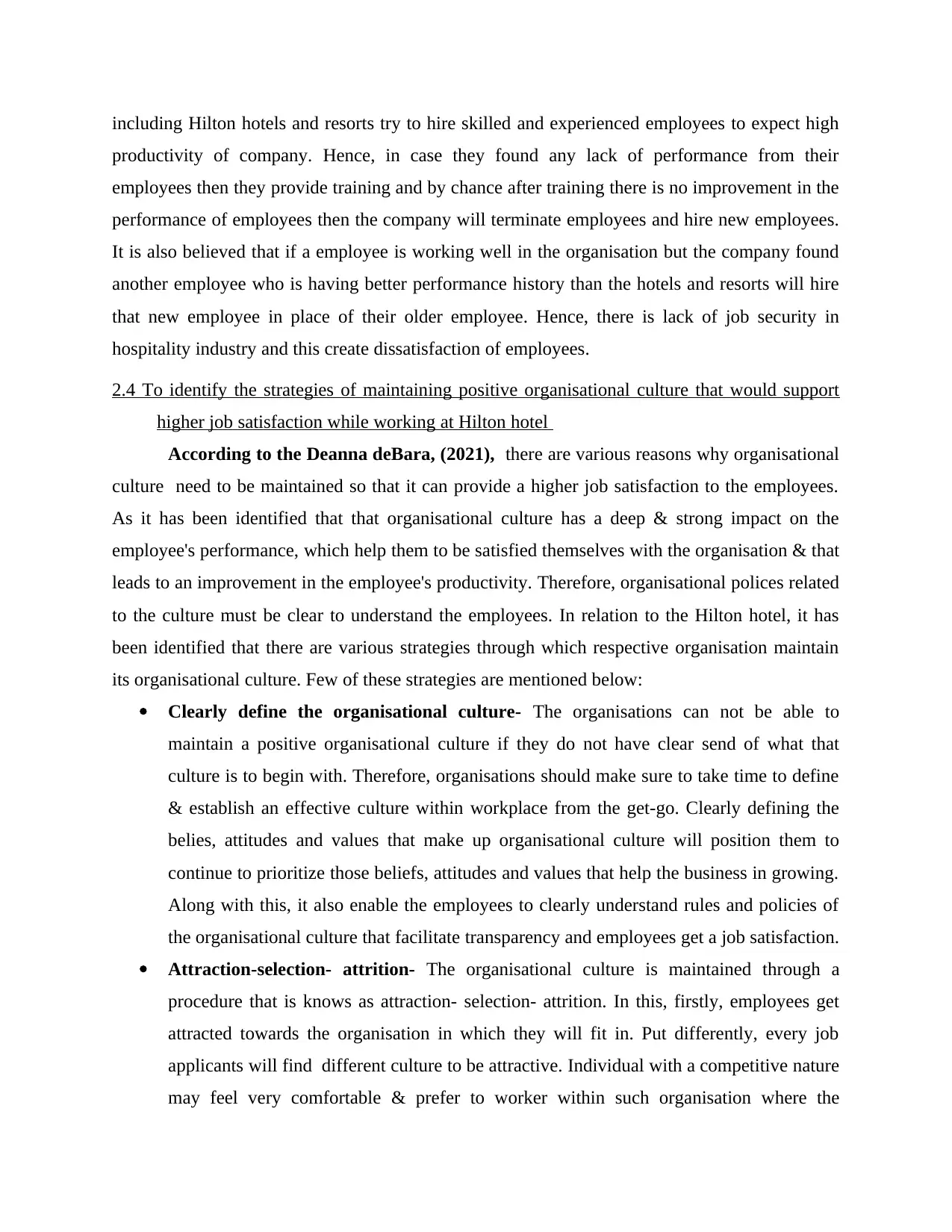
productivity of company. Hence, in case they found any lack of performance from their
employees then they provide training and by chance after training there is no improvement in the
performance of employees then the company will terminate employees and hire new employees.
It is also believed that if a employee is working well in the organisation but the company found
another employee who is having better performance history than the hotels and resorts will hire
that new employee in place of their older employee. Hence, there is lack of job security in
hospitality industry and this create dissatisfaction of employees.
2.4 To identify the strategies of maintaining positive organisational culture that would support
higher job satisfaction while working at Hilton hotel
According to the Deanna deBara, (2021), there are various reasons why organisational
culture need to be maintained so that it can provide a higher job satisfaction to the employees.
As it has been identified that that organisational culture has a deep & strong impact on the
employee's performance, which help them to be satisfied themselves with the organisation & that
leads to an improvement in the employee's productivity. Therefore, organisational polices related
to the culture must be clear to understand the employees. In relation to the Hilton hotel, it has
been identified that there are various strategies through which respective organisation maintain
its organisational culture. Few of these strategies are mentioned below:
Clearly define the organisational culture- The organisations can not be able to
maintain a positive organisational culture if they do not have clear send of what that
culture is to begin with. Therefore, organisations should make sure to take time to define
& establish an effective culture within workplace from the get-go. Clearly defining the
belies, attitudes and values that make up organisational culture will position them to
continue to prioritize those beliefs, attitudes and values that help the business in growing.
Along with this, it also enable the employees to clearly understand rules and policies of
the organisational culture that facilitate transparency and employees get a job satisfaction.
Attraction-selection- attrition- The organisational culture is maintained through a
procedure that is knows as attraction- selection- attrition. In this, firstly, employees get
attracted towards the organisation in which they will fit in. Put differently, every job
applicants will find different culture to be attractive. Individual with a competitive nature
may feel very comfortable & prefer to worker within such organisation where the
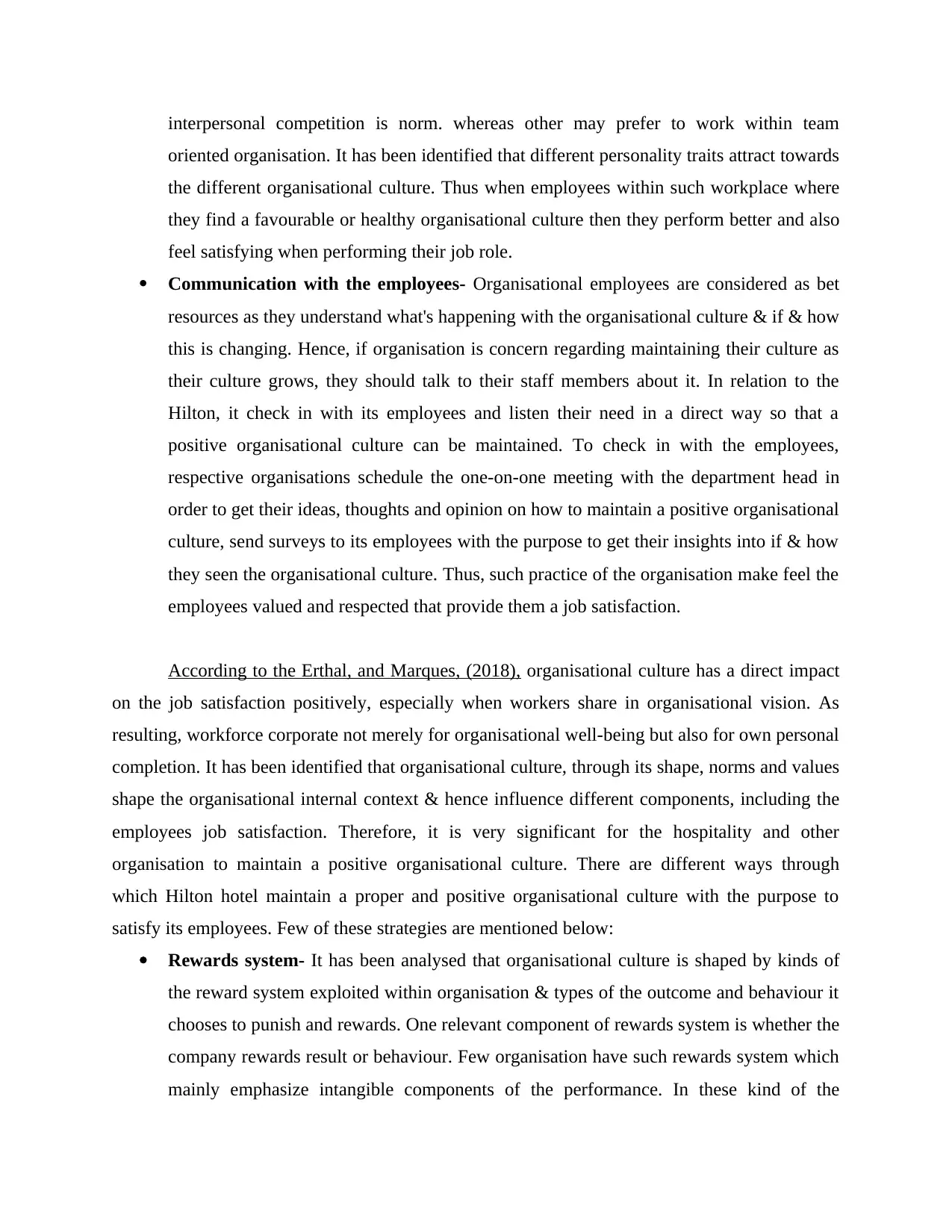
oriented organisation. It has been identified that different personality traits attract towards
the different organisational culture. Thus when employees within such workplace where
they find a favourable or healthy organisational culture then they perform better and also
feel satisfying when performing their job role.
Communication with the employees- Organisational employees are considered as bet
resources as they understand what's happening with the organisational culture & if & how
this is changing. Hence, if organisation is concern regarding maintaining their culture as
their culture grows, they should talk to their staff members about it. In relation to the
Hilton, it check in with its employees and listen their need in a direct way so that a
positive organisational culture can be maintained. To check in with the employees,
respective organisations schedule the one-on-one meeting with the department head in
order to get their ideas, thoughts and opinion on how to maintain a positive organisational
culture, send surveys to its employees with the purpose to get their insights into if & how
they seen the organisational culture. Thus, such practice of the organisation make feel the
employees valued and respected that provide them a job satisfaction.
According to the Erthal, and Marques, (2018), organisational culture has a direct impact
on the job satisfaction positively, especially when workers share in organisational vision. As
resulting, workforce corporate not merely for organisational well-being but also for own personal
completion. It has been identified that organisational culture, through its shape, norms and values
shape the organisational internal context & hence influence different components, including the
employees job satisfaction. Therefore, it is very significant for the hospitality and other
organisation to maintain a positive organisational culture. There are different ways through
which Hilton hotel maintain a proper and positive organisational culture with the purpose to
satisfy its employees. Few of these strategies are mentioned below:
Rewards system- It has been analysed that organisational culture is shaped by kinds of
the reward system exploited within organisation & types of the outcome and behaviour it
chooses to punish and rewards. One relevant component of rewards system is whether the
company rewards result or behaviour. Few organisation have such rewards system which
mainly emphasize intangible components of the performance. In these kind of the
⊘ This is a preview!⊘
Do you want full access?
Subscribe today to unlock all pages.

Trusted by 1+ million students worldwide
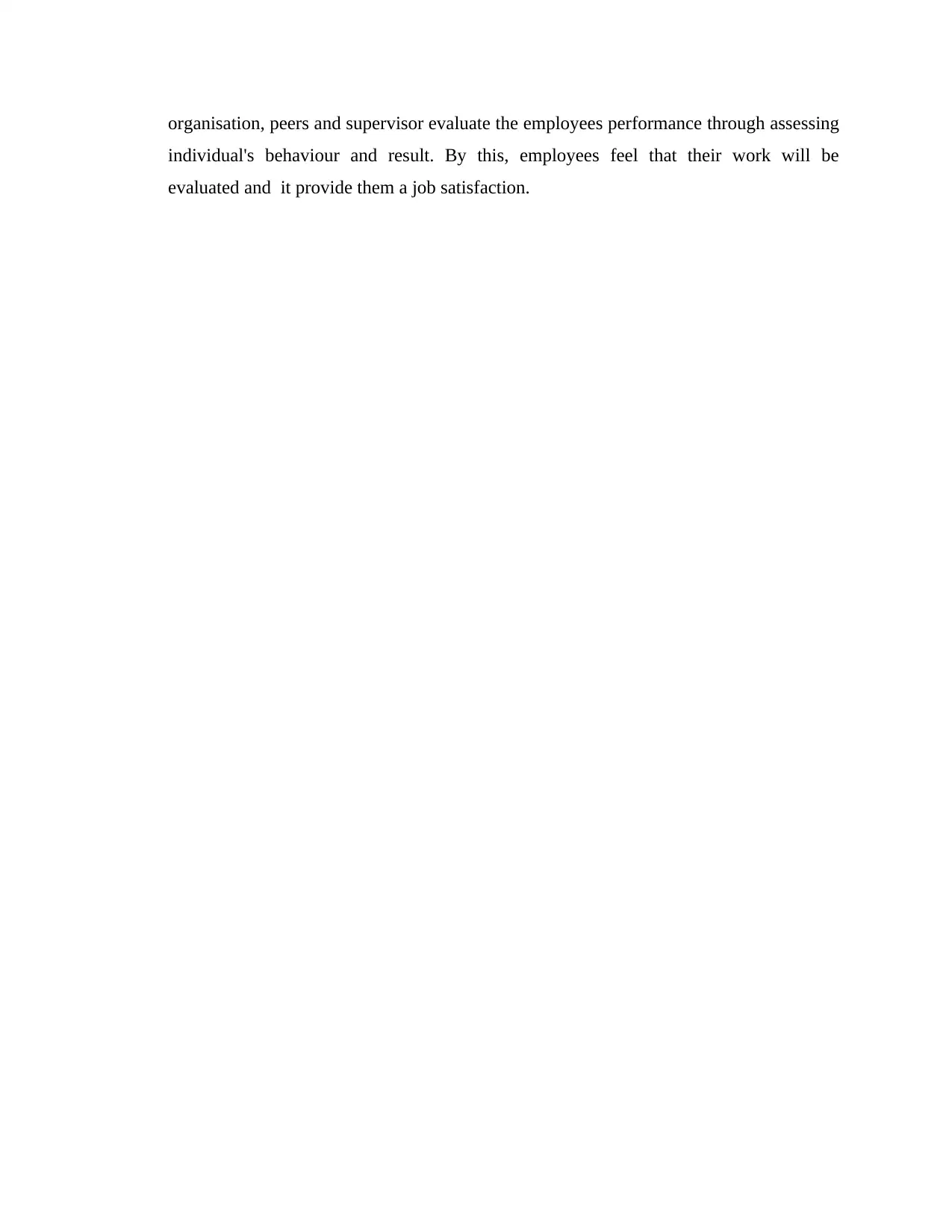
individual's behaviour and result. By this, employees feel that their work will be
evaluated and it provide them a job satisfaction.
Paraphrase This Document
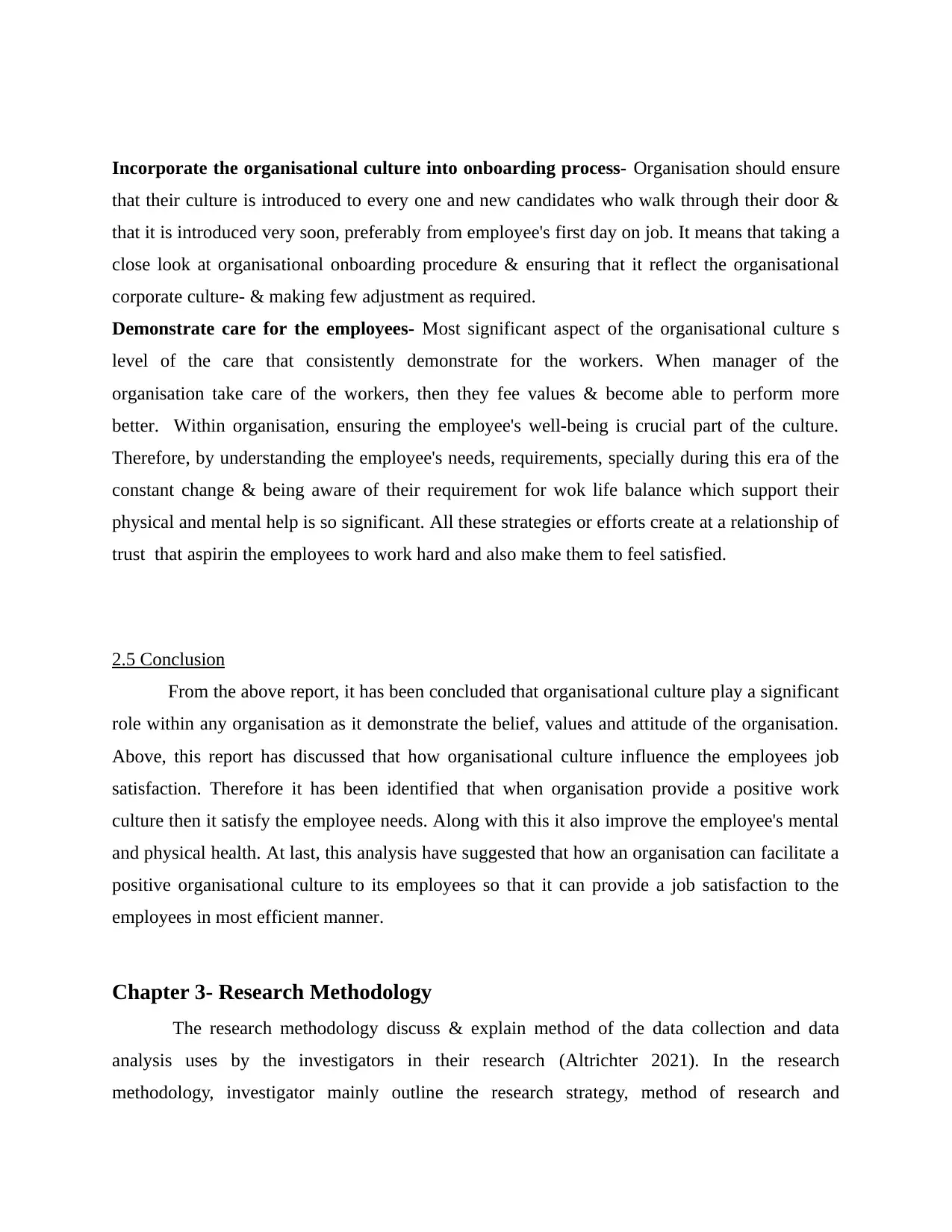
that their culture is introduced to every one and new candidates who walk through their door &
that it is introduced very soon, preferably from employee's first day on job. It means that taking a
close look at organisational onboarding procedure & ensuring that it reflect the organisational
corporate culture- & making few adjustment as required.
Demonstrate care for the employees- Most significant aspect of the organisational culture s
level of the care that consistently demonstrate for the workers. When manager of the
organisation take care of the workers, then they fee values & become able to perform more
better. Within organisation, ensuring the employee's well-being is crucial part of the culture.
Therefore, by understanding the employee's needs, requirements, specially during this era of the
constant change & being aware of their requirement for wok life balance which support their
physical and mental help is so significant. All these strategies or efforts create at a relationship of
trust that aspirin the employees to work hard and also make them to feel satisfied.
2.5 Conclusion
From the above report, it has been concluded that organisational culture play a significant
role within any organisation as it demonstrate the belief, values and attitude of the organisation.
Above, this report has discussed that how organisational culture influence the employees job
satisfaction. Therefore it has been identified that when organisation provide a positive work
culture then it satisfy the employee needs. Along with this it also improve the employee's mental
and physical health. At last, this analysis have suggested that how an organisation can facilitate a
positive organisational culture to its employees so that it can provide a job satisfaction to the
employees in most efficient manner.
Chapter 3- Research Methodology
The research methodology discuss & explain method of the data collection and data
analysis uses by the investigators in their research (Altrichter 2021). In the research
methodology, investigator mainly outline the research strategy, method of research and
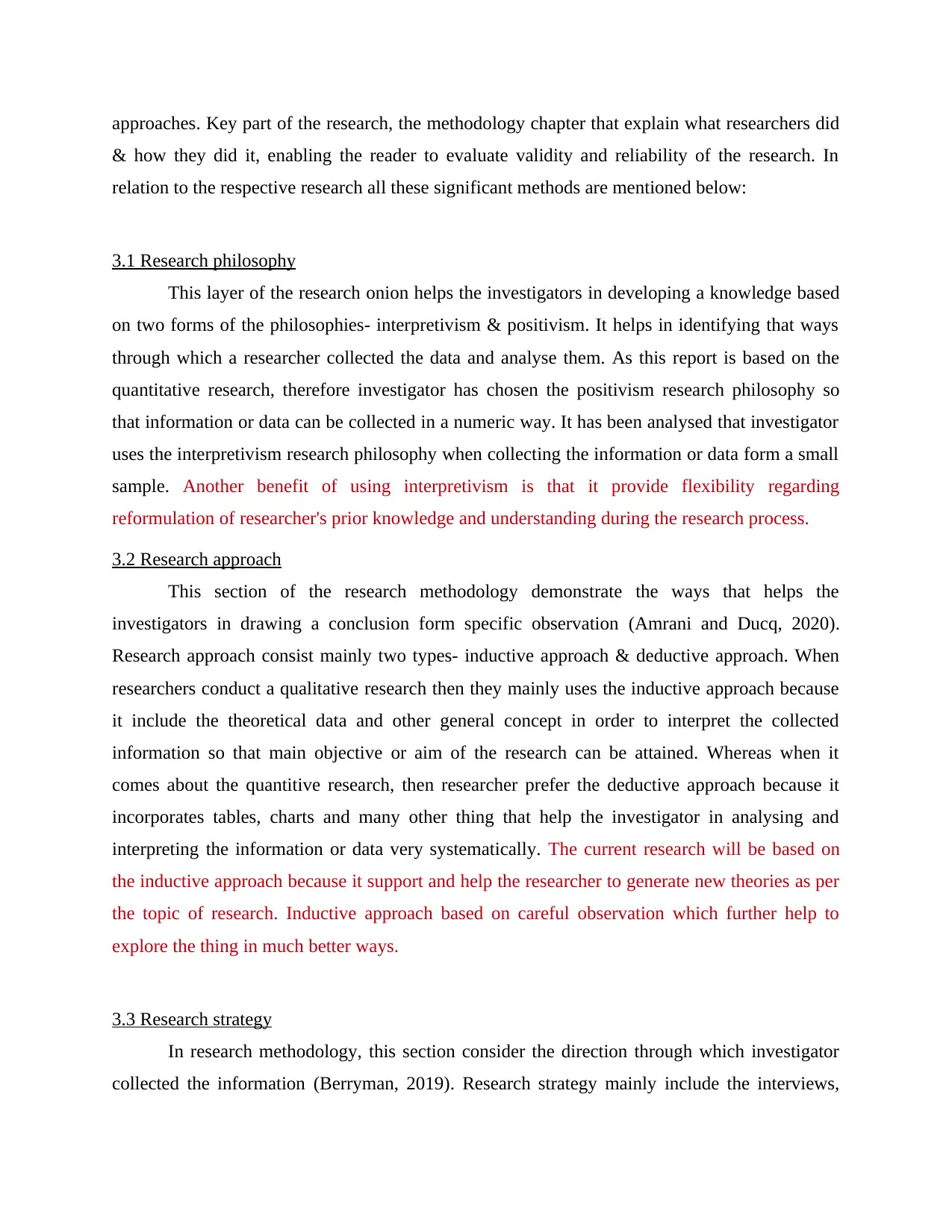
& how they did it, enabling the reader to evaluate validity and reliability of the research. In
relation to the respective research all these significant methods are mentioned below:
3.1 Research philosophy
This layer of the research onion helps the investigators in developing a knowledge based
on two forms of the philosophies- interpretivism & positivism. It helps in identifying that ways
through which a researcher collected the data and analyse them. As this report is based on the
quantitative research, therefore investigator has chosen the positivism research philosophy so
that information or data can be collected in a numeric way. It has been analysed that investigator
uses the interpretivism research philosophy when collecting the information or data form a small
sample. Another benefit of using interpretivism is that it provide flexibility regarding
reformulation of researcher's prior knowledge and understanding during the research process.
3.2 Research approach
This section of the research methodology demonstrate the ways that helps the
investigators in drawing a conclusion form specific observation (Amrani and Ducq, 2020).
Research approach consist mainly two types- inductive approach & deductive approach. When
researchers conduct a qualitative research then they mainly uses the inductive approach because
it include the theoretical data and other general concept in order to interpret the collected
information so that main objective or aim of the research can be attained. Whereas when it
comes about the quantitive research, then researcher prefer the deductive approach because it
incorporates tables, charts and many other thing that help the investigator in analysing and
interpreting the information or data very systematically. The current research will be based on
the inductive approach because it support and help the researcher to generate new theories as per
the topic of research. Inductive approach based on careful observation which further help to
explore the thing in much better ways.
3.3 Research strategy
In research methodology, this section consider the direction through which investigator
collected the information (Berryman, 2019). Research strategy mainly include the interviews,
⊘ This is a preview!⊘
Do you want full access?
Subscribe today to unlock all pages.

Trusted by 1+ million students worldwide
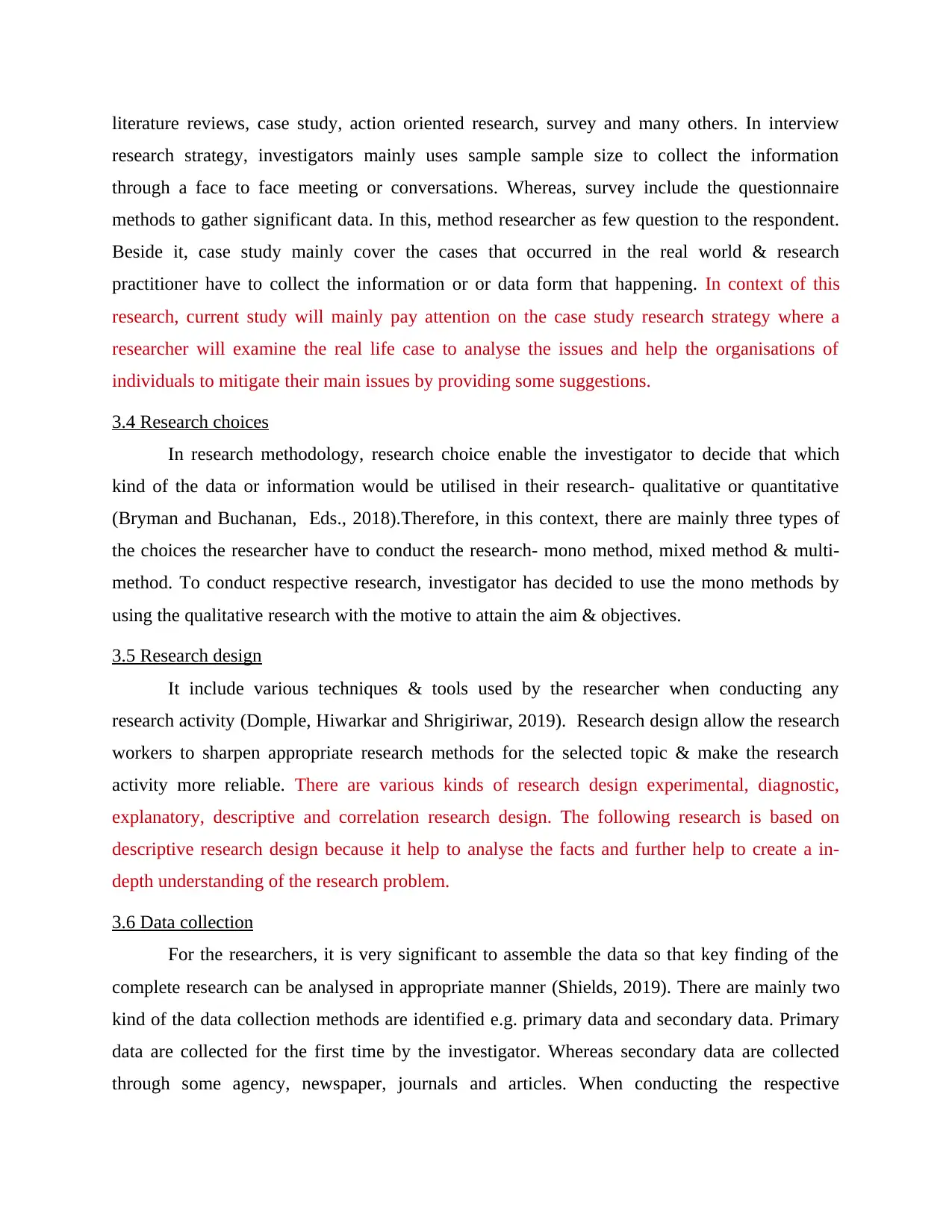
research strategy, investigators mainly uses sample sample size to collect the information
through a face to face meeting or conversations. Whereas, survey include the questionnaire
methods to gather significant data. In this, method researcher as few question to the respondent.
Beside it, case study mainly cover the cases that occurred in the real world & research
practitioner have to collect the information or or data form that happening. In context of this
research, current study will mainly pay attention on the case study research strategy where a
researcher will examine the real life case to analyse the issues and help the organisations of
individuals to mitigate their main issues by providing some suggestions.
3.4 Research choices
In research methodology, research choice enable the investigator to decide that which
kind of the data or information would be utilised in their research- qualitative or quantitative
(Bryman and Buchanan, Eds., 2018).Therefore, in this context, there are mainly three types of
the choices the researcher have to conduct the research- mono method, mixed method & multi-
method. To conduct respective research, investigator has decided to use the mono methods by
using the qualitative research with the motive to attain the aim & objectives.
3.5 Research design
It include various techniques & tools used by the researcher when conducting any
research activity (Domple, Hiwarkar and Shrigiriwar, 2019). Research design allow the research
workers to sharpen appropriate research methods for the selected topic & make the research
activity more reliable. There are various kinds of research design experimental, diagnostic,
explanatory, descriptive and correlation research design. The following research is based on
descriptive research design because it help to analyse the facts and further help to create a in-
depth understanding of the research problem.
3.6 Data collection
For the researchers, it is very significant to assemble the data so that key finding of the
complete research can be analysed in appropriate manner (Shields, 2019). There are mainly two
kind of the data collection methods are identified e.g. primary data and secondary data. Primary
data are collected for the first time by the investigator. Whereas secondary data are collected
through some agency, newspaper, journals and articles. When conducting the respective
Paraphrase This Document
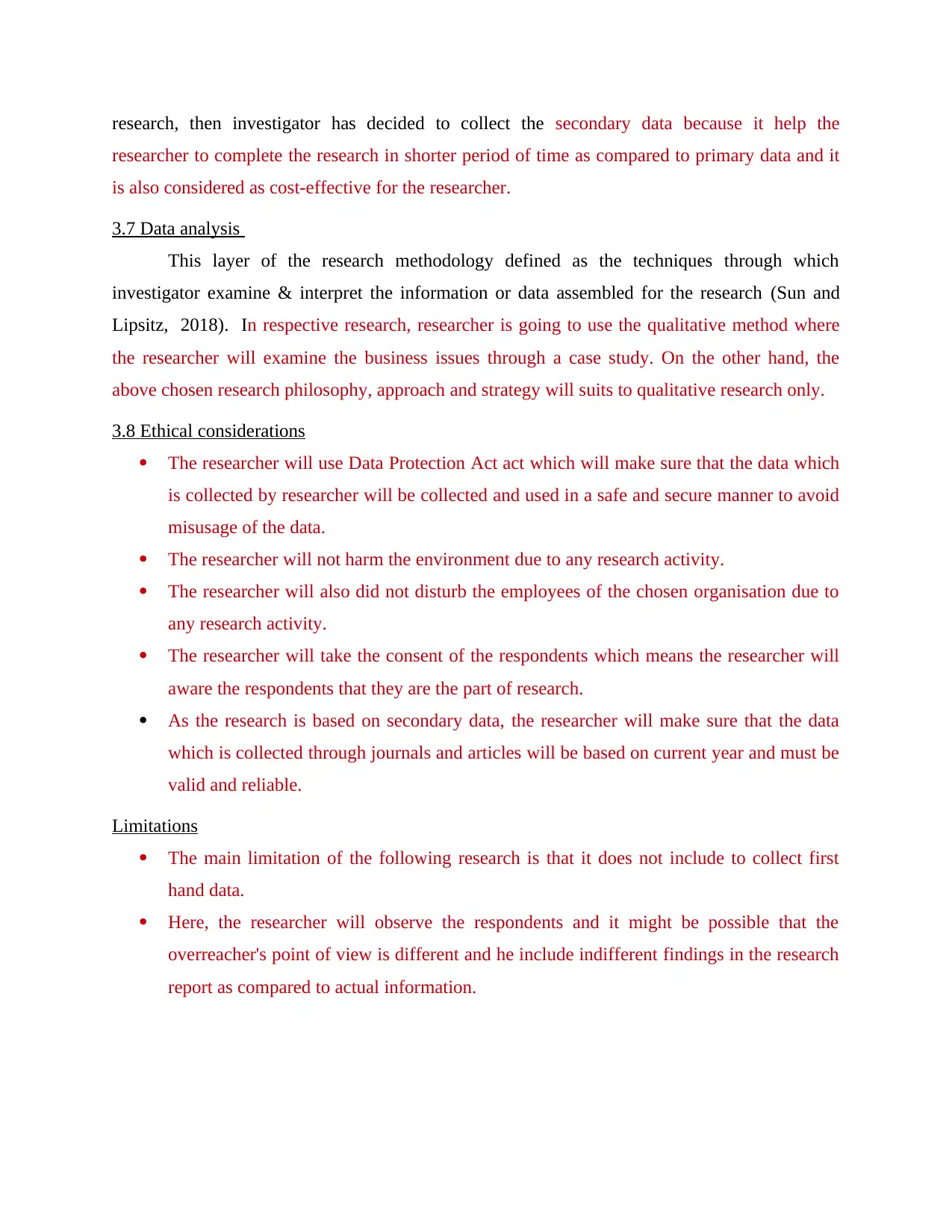
researcher to complete the research in shorter period of time as compared to primary data and it
is also considered as cost-effective for the researcher.
3.7 Data analysis
This layer of the research methodology defined as the techniques through which
investigator examine & interpret the information or data assembled for the research (Sun and
Lipsitz, 2018). In respective research, researcher is going to use the qualitative method where
the researcher will examine the business issues through a case study. On the other hand, the
above chosen research philosophy, approach and strategy will suits to qualitative research only.
3.8 Ethical considerations
The researcher will use Data Protection Act act which will make sure that the data which
is collected by researcher will be collected and used in a safe and secure manner to avoid
misusage of the data.
The researcher will not harm the environment due to any research activity.
The researcher will also did not disturb the employees of the chosen organisation due to
any research activity.
The researcher will take the consent of the respondents which means the researcher will
aware the respondents that they are the part of research.
As the research is based on secondary data, the researcher will make sure that the data
which is collected through journals and articles will be based on current year and must be
valid and reliable.
Limitations
The main limitation of the following research is that it does not include to collect first
hand data.
Here, the researcher will observe the respondents and it might be possible that the
overreacher's point of view is different and he include indifferent findings in the research
report as compared to actual information.
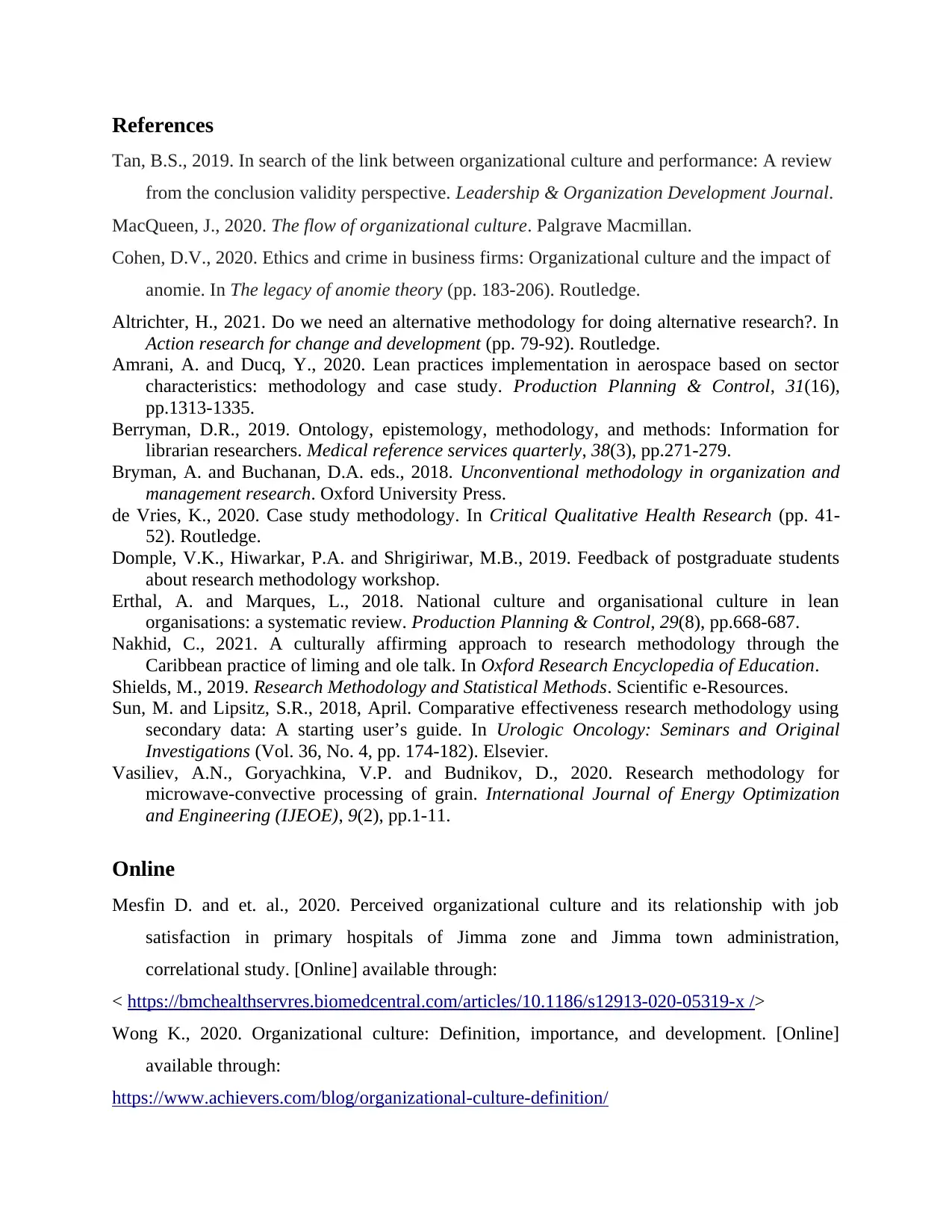
Tan, B.S., 2019. In search of the link between organizational culture and performance: A review
from the conclusion validity perspective. Leadership & Organization Development Journal.
MacQueen, J., 2020. The flow of organizational culture. Palgrave Macmillan.
Cohen, D.V., 2020. Ethics and crime in business firms: Organizational culture and the impact of
anomie. In The legacy of anomie theory (pp. 183-206). Routledge.
Altrichter, H., 2021. Do we need an alternative methodology for doing alternative research?. In
Action research for change and development (pp. 79-92). Routledge.
Amrani, A. and Ducq, Y., 2020. Lean practices implementation in aerospace based on sector
characteristics: methodology and case study. Production Planning & Control, 31(16),
pp.1313-1335.
Berryman, D.R., 2019. Ontology, epistemology, methodology, and methods: Information for
librarian researchers. Medical reference services quarterly, 38(3), pp.271-279.
Bryman, A. and Buchanan, D.A. eds., 2018. Unconventional methodology in organization and
management research. Oxford University Press.
de Vries, K., 2020. Case study methodology. In Critical Qualitative Health Research (pp. 41-
52). Routledge.
Domple, V.K., Hiwarkar, P.A. and Shrigiriwar, M.B., 2019. Feedback of postgraduate students
about research methodology workshop.
Erthal, A. and Marques, L., 2018. National culture and organisational culture in lean
organisations: a systematic review. Production Planning & Control, 29(8), pp.668-687.
Nakhid, C., 2021. A culturally affirming approach to research methodology through the
Caribbean practice of liming and ole talk. In Oxford Research Encyclopedia of Education.
Shields, M., 2019. Research Methodology and Statistical Methods. Scientific e-Resources.
Sun, M. and Lipsitz, S.R., 2018, April. Comparative effectiveness research methodology using
secondary data: A starting user’s guide. In Urologic Oncology: Seminars and Original
Investigations (Vol. 36, No. 4, pp. 174-182). Elsevier.
Vasiliev, A.N., Goryachkina, V.P. and Budnikov, D., 2020. Research methodology for
microwave-convective processing of grain. International Journal of Energy Optimization
and Engineering (IJEOE), 9(2), pp.1-11.
Online
Mesfin D. and et. al., 2020. Perceived organizational culture and its relationship with job
satisfaction in primary hospitals of Jimma zone and Jimma town administration,
correlational study. [Online] available through:
< https://bmchealthservres.biomedcentral.com/articles/10.1186/s12913-020-05319-x />
Wong K., 2020. Organizational culture: Definition, importance, and development. [Online]
available through:
https://www.achievers.com/blog/organizational-culture-definition/
⊘ This is a preview!⊘
Do you want full access?
Subscribe today to unlock all pages.

Trusted by 1+ million students worldwide
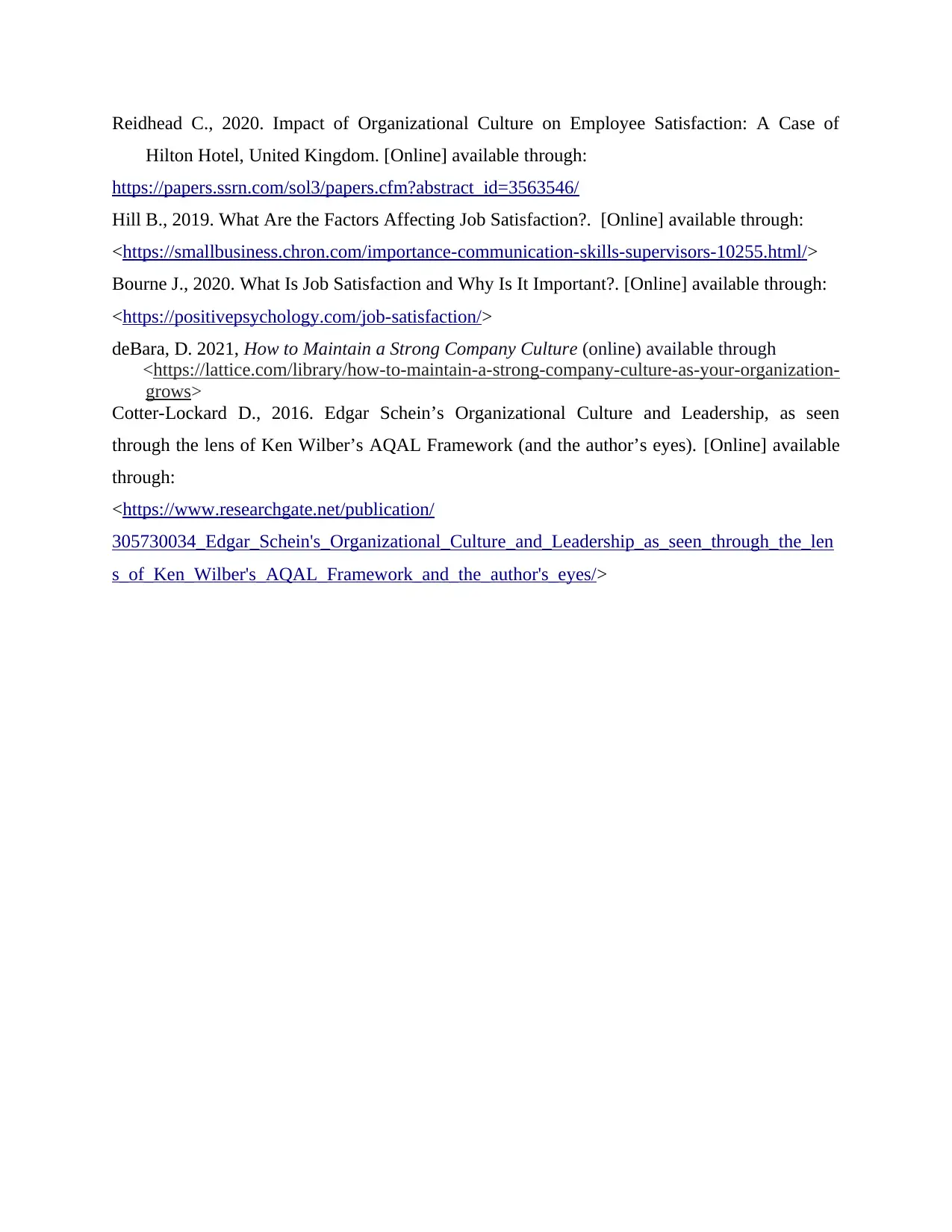
Hilton Hotel, United Kingdom. [Online] available through:
https://papers.ssrn.com/sol3/papers.cfm?abstract_id=3563546/
Hill B., 2019. What Are the Factors Affecting Job Satisfaction?. [Online] available through:
<https://smallbusiness.chron.com/importance-communication-skills-supervisors-10255.html/>
Bourne J., 2020. What Is Job Satisfaction and Why Is It Important?. [Online] available through:
<https://positivepsychology.com/job-satisfaction/>
deBara, D. 2021, How to Maintain a Strong Company Culture (online) available through
<https://lattice.com/library/how-to-maintain-a-strong-company-culture-as-your-organization-
grows>
Cotter-Lockard D., 2016. Edgar Schein’s Organizational Culture and Leadership, as seen
through the lens of Ken Wilber’s AQAL Framework (and the author’s eyes). [Online] available
through:
<https://www.researchgate.net/publication/
305730034_Edgar_Schein's_Organizational_Culture_and_Leadership_as_seen_through_the_len
s_of_Ken_Wilber's_AQAL_Framework_and_the_author's_eyes/>
Related Documents
Your All-in-One AI-Powered Toolkit for Academic Success.
+13062052269
info@desklib.com
Available 24*7 on WhatsApp / Email
![[object Object]](/_next/static/media/star-bottom.7253800d.svg)
© 2024 | Zucol Services PVT LTD | All rights reserved.





